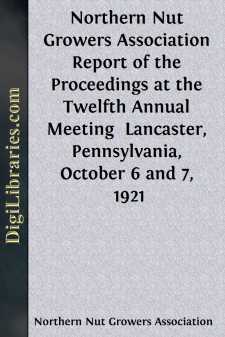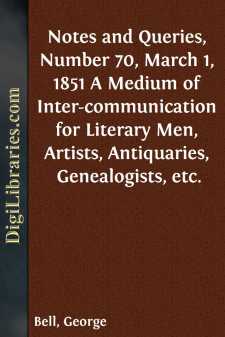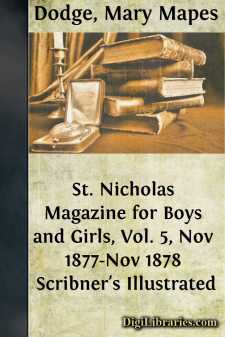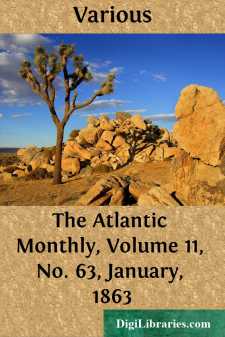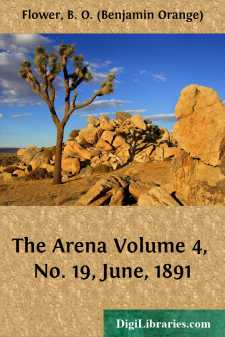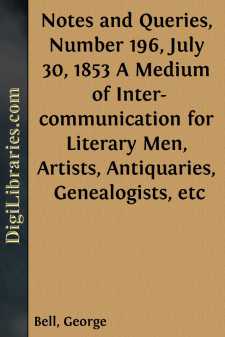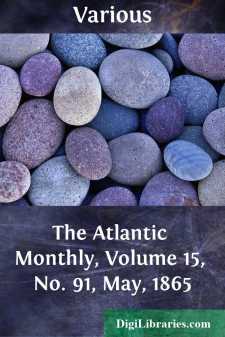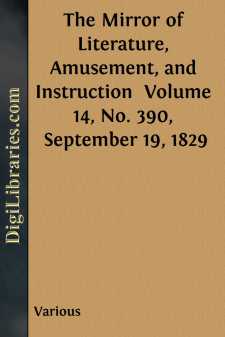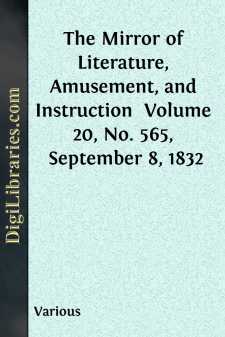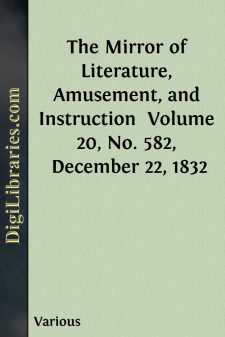Periodicals
- Art 27
- Children's periodicals 59
- Entertainment 5
- Food/Wine 2
- Games/Humor 455
- General
- Health 1
- History 53
- House/Home 1
- Regional 62
- Science/Nature 118
- Transportation 10
General Books
Sort by:
OFFICERS OF THE ASSOCIATION PresidentJames S. McGlennon Rochester, New YorkVice-PresidentJ. F. Jones Lancaster, PennsylvaniaTreasurerWillard G. Bixby Baldwin, Nassau Co., New YorkAuditing—C. P. Close, C. A. ReedExecutive—J. Russell SMITH, W. S. Linton and the OfficersFinance—T. P. Littlepage, Willard G. Bixby, W. C. DemingHybrids—R. T. Morris, C. P. Close, W. G. Bixby, Howard...
more...
by:
George Bell
A WORD TO THE LITERARY MEN OF ENGLAND. "Twenty scholars in seven years might retrieve the worst losses we experience from the bigotry of popes and califs. I do not intend to assert that every Herculanean manuscript might, within that period, be unfolded; but the three first legible sentences might be; which is quite sufficient to inform the intelligent reader whether a farther attempt on the scroll...
more...
by:
Mary Mapes Dodge
ONE SATURDAY BY SARAH WINTER KELLOGG. It was an autumn day in the Indian summer time,—that one Saturday. The Grammar Room class of Budville were going nutting; that is, eight of them were going,—"our set," as they styled themselves. Besides the eight of "our set," Bob Trotter was going along as driver, to take care of the horses and spring wagon on arrival at the woods, while the...
more...
by:
Various
HAPPIEST DAYS. Long ago, when you were a little boy or a little girl,—perhaps not so very long ago, either,—were you never interrupted in your play by being called in to have your face washed, your hair combed, and your soiled apron exchanged for a clean one, preparatory to an introduction to Mrs. Smith, or Dr. Jones, or Aunt Judkins, your mother's early friend? And after being ushered in to...
more...
History repeats itself, but on new planes. Often, a symbol appears in one age, and the spirit of which it is the expression is revealed in another. Each answers the need of its own time. From the creative standpoint, which is out of time, spirit and symbol are one; but to us, who see things successively, they seem as prior and posterior. If this be so, it should be possible for a thoughtful and...
more...
by:
George Bell
BOOKS CHAINED TO DESKS IN CHURCHES: FONT INSCRIPTION: PAROCHIAL LIBRARIES. It would be interesting to have a complete list of the various books still to be found chained to desks in our ancient churches. The "Bible of the largest volume," the "Books of Homilies allowed by authority," and the Book of Common Prayer, are ordered by Canon 80. to be provided for every church. In some places...
more...
by:
Various
WITH THE BIRDS. Not in the spirit of exact science, but rather with the freedom of love and old acquaintance, would I celebrate some of the minstrels of the field and forest,—these accredited and authenticated poets of Nature. All day, while the rain has pattered and murmured, have I heard the notes of the Robin and the Wood-Thrush; the Red-Eyed Flycatcher has pursued his game within a few feet of my...
more...
by:
Various
CLIFTON. Clifton is the Montpellier of England, and is associated with all that is delightful in nature: of this, the Engraving before us is a true picture, whether we contemplate the winding Avon; the sublime beauty of its rocks— Clifton's airy rocks, (as Mr. Bowles poetically calls them), the picturesque scenery of the opposite shore; or the abodes of cottage comforts which cluster into a...
more...
by:
Various
PERSIAN BATH. The luxurious indulgence of baths in the East is generally known to the reader of travels, so as to render acceptable the following details. They are extracted from Mr. Buckingham's Travels, and bear all the graphic minuteness of his entertaining pen. The Bath is one of the principal ones of Kermanshah, an important frontier town of Persia. "It was entered by a porch, extremely...
more...
by:
Various
THE YORK COLUMN. Five years have now elapsed since the improvements in St. James's Park were commenced, by order of Government, for the gratification of the people. We were early in our congratulation, as well as illustration, of the prospective advantages of these plans for the public enjoyment, as will be seen on reference to our tenth volume; and, with respect to the re-disposal of St....
more...


